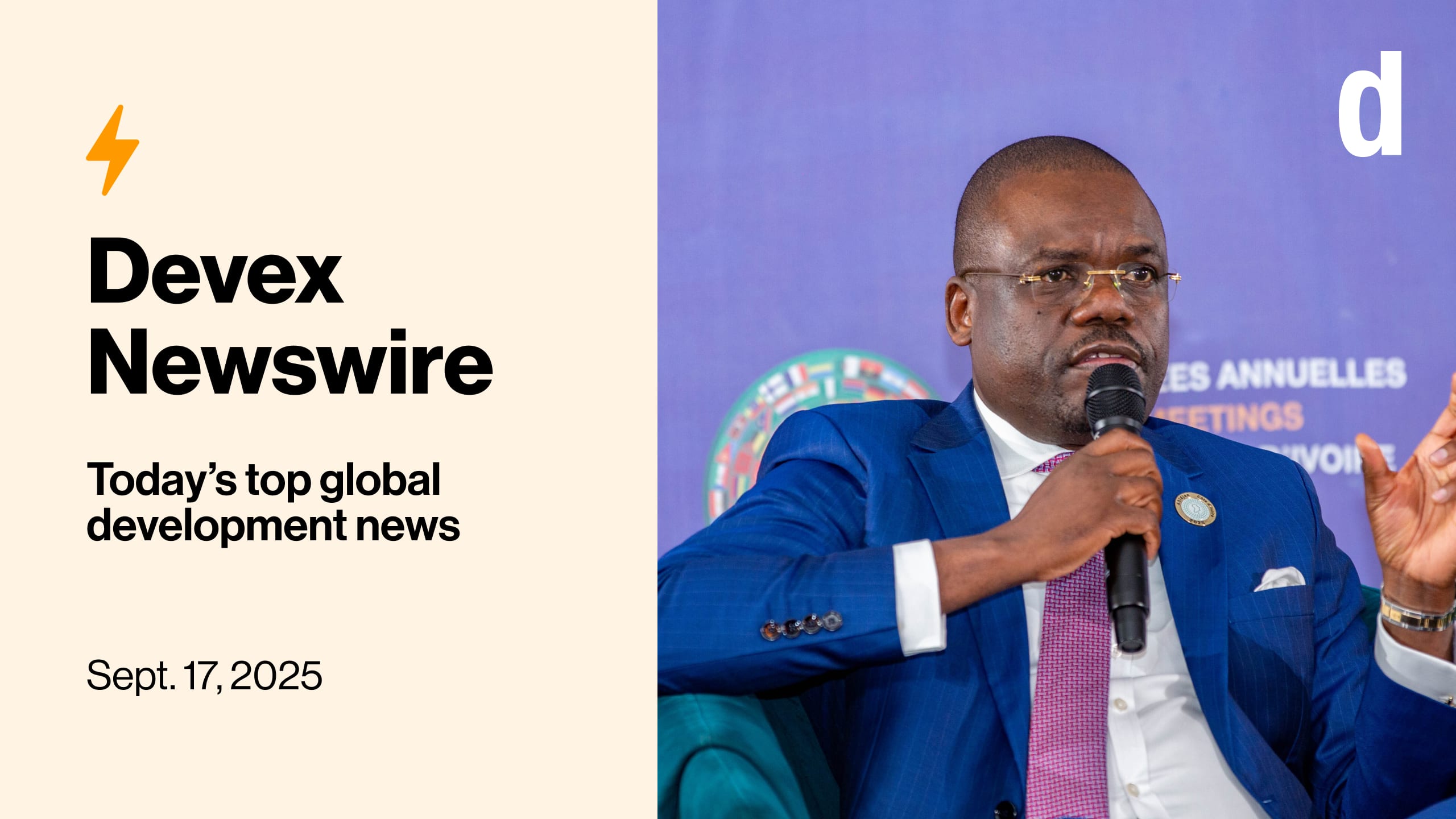
Africa’s leaders want pharmaceutical autonomy. The continent is crafting a different vision for how innovation, intellectual property, and access to pharmaceutical products will play out.
Also in today’s edition: Climate adaptation finance must urgently increase — but how? And we explain how to wow recruiters at Tetra Tech.
Going it alone
Africa's leadership has embarked on a bold endeavor to ramp up pharmaceutical manufacturing on the continent. The aim? To create health security for its people that’s sturdy enough to withstand the many challenges ahead.
This is a preview of Newswire
Sign up to this newsletter for an inside look at the biggest stories in global development, in your inbox daily.
But establishing autonomy is no easy feat, and one big hurdle looms large: access to manufacturing licenses. With pharmaceutical patent holders mostly overseas, securing permissions is a complex task, and there aren’t enough partnerships with foreign entities to guide local producers.
On top of that, there’s a scarcity of trained personnel, inadequate infrastructure, a dearth of local research and development initiatives, feeble regulatory frameworks, and financial risks to potential investors.
The tides are slowly turning, however, and a lot of effort is being funneled into making this happen, writes Devex Senior Reporter Sara Jerving. As part of the push, experts gathered in Addis Ababa, Ethiopia, for the first International Conference on Innovation, Intellectual Property and Technology Transfer in Africa’s Pharmaceutical Sector — hosted by the new African Pharmaceutical Technology Foundation, which was launched by the African Development Bank.
But there are no panaceas, and numerous barriers must be dismantled for things to fall into place, participants said. While power predominantly lies outside the continent — in the hands of multinational pharmaceutical giants — African nations have levers capable of reshaping the status quo.
“We are in a defining moment. We really need to make sure that we will not miss the opportunity,” says Michel Sidibé, the African Union special envoy for the African Medicines Agency. “We really need a paradigm shift … from a privilege-centered approach to a people-centered approach.”
Sara lays out just what’s needed to transform issues around intellectual property and technology transfer in Africa’s pharmaceutical manufacturing and gives the lowdown on the difficulties ahead.
Read: Inside the push to make intellectual property work for African pharma
+ This article is part of Roots of Change, our new partnership series examining the push toward locally led development. Explore the series.
And if you haven’t already, download your copy of our newly updated report, The localization agenda 2.0, for the latest insights and analysis on localization.
Mind the gap
The latest findings from the United Nations provide a bit of a stark wake-up call — the financial burden for adapting to climate change in low- and middle-income countries has surged beyond previous estimates by at least 50%.
This means that vulnerable nations now require $194 billion to $366 billion annually just to cope with the escalating impacts of the climate crisis, according to the U.N. Environment Programme's Adaptation Gap Report.
The current financial reality is grim: Between 2016 and 2021, adaptation finance only averaged $19 billion a year, barely totaling 25% of total climate finance. And even as the need for adaptation grows more urgent, public financing for it has dwindled since 2020, in bleak contrast to the increasing support for mitigation efforts during the same period.
What limited international public financing exists mostly comes from bilateral donors, multilateral development banks like the World Bank, and specialized climate funds such as the Green Climate Fund. But the bulk of this funding is allocated on a project-by-project basis, leaving smaller governments struggling to devise and sustain long-term adaptation strategies — and there’s less than a year for the world to meet the Glasgow Climate Pact commitment to double the amount of climate change adaptation finance.
Read: Climate adaptation finance must double by 2025. How will that happen? (Pro)
+ A Devex Pro membership brings you exclusive in-depth reporting and analyses, data-driven funding insights, invite-only events, and access to the world’s largest global development job board. Get these perks and more by signing up for a 15-day free trial today.
Opinion corner
• A series of recent studies on postpartum family planning show limited to no effects on rates of unintended pregnancy. So why is development funding still going to these programs? “Postpartum family planning is likely a poor use of resources in contexts where many of the women it reaches are not interested or in need of its services,” writes Sarah Eustis-Guthrie from the Maternal Health Initiative in her opinion piece for Devex.
• Africa has the greatest disease burden in the world, but less than 3% of clinical trials are conducted on the continent. “This is a significant missed opportunity,” writes Monique Adams, the executive director, global head of diversity and inclusion in clinical trials at Sanofi, in her opinion piece for Devex, which argues that building trust, improving access, and providing continuity of care are key to increasing clinical trials in Africa.
• Climate change-induced disasters and conflict now regularly make headlines, but not enough attention is paid to the role that water can play as a stabilizing force in these crises — and not enough investments are being made into water, sanitation, and hygiene, writes Michelle Brown from Action Against Hunger in her opinion piece for Devex.
+ Want to write an opinion article for Devex? Email us your pitch at editor@devex.com.
Tetra Tech’s tips
In the competitive realm of development consulting, one question looms large: How do you differentiate yourself? It's not merely a matter of possessing the requisite experience; it's about articulating how that experience aligns with the job at hand.
Recent data from Devex job board positions found Tetra Tech is among the top three recruiters in the global development consulting arena, boasting 420 job postings in the past year alone. So, Devex contributor Katrina Lane spoke to four Tetra Tech recruiters and HR professionals to uncover what sets successful applicants apart.
• Crafting a clear, tailored CV is paramount — being succinct and summarizing relevant technical experiences and international exposure.
• Intersectional competency is also key. Development challenges often transcend disciplinary boundaries, meaning diverse expertise. Tetra Tech underscores the value of individuals adept at integrating various perspectives, from climate-smart agriculture to gender analysis.
• Transferable skills and flexibility reign supreme, they say. Yet, amid the profusion of skills, one trait remains perennially in demand: effective communication.
To find out more, read: How to make your job application stand out with Tetra Tech recruiters
+ Sign up to Devex Career Hub — a free, weekly newsletter — to get global development’s top jobs and expert career advice.
Making it rain
Beginning this October, the U.S. federal government will make big changes to the way it gives away money: reducing compliance costs, removing barriers to entry, and eliminating the requirement to write applications and grants in English.
But foreign organizations working with the U.S. government will also get a big boost, as the new guidance mandates minimum indirect cost recovery rates of 15%, up from 10% in years past, my colleague Elissa Miolene tells me.
"These rules changes are an important step forward in reducing the complexity of USAID’s procurement system and dismantling some of the hurdles for new and innovative local partners to work with the agency," said Tod Preston, the executive director of the Modernizing Foreign Assistance Network, in a statement.
ICYMI: The White House is rethinking grantmaking. What does it mean for aid? (Pro)
+ A Devex Pro membership lets you get the most out of our coverage of the U.S. aid sector.
In other news
The European Union is poised to vote on a vast overhaul of its immigration policy, aimed at tightening entry procedures for asylum-seekers and enforcing shared responsibility among all member states. [Barron’s]
French diplomat Stéphane Séjourné announced that Paris plans to invest €400 million in Rwanda's environment, health, and education sectors over the next five years as it aims to renew ties with Kigali. [France 24]
The first U.N. food aid in months has reached Sudan’s Darfur region, following talks to reopen humanitarian corridors from Chad amid warnings of millions facing acute hunger. [Al Jazeera]
Sign up to Newswire for an inside look at the biggest stories in global development.








